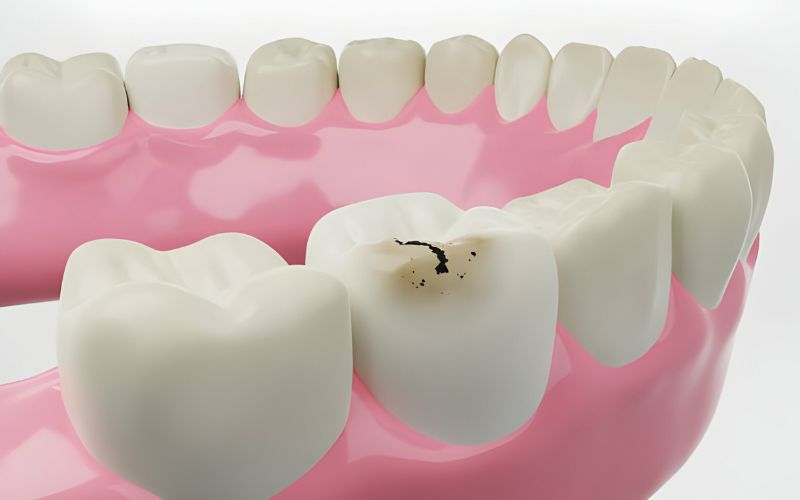Have you ever wondered what the secret ingredient is behind that sparkling, healthy smile you’re aiming for? Well, let me introduce you to an everyday superhero that doesn’t wear a cape but is incredibly powerful in the world of oral health: fluoride. Yes, that fluoride—the one you’ve seen listed on your toothpaste tube and maybe not thought much about. It turns out, this natural mineral is a game changer for keeping our teeth strong and resilient against cavities.
So, how does it work its magic, and why is it so crucial for our smiles? Join me as we dive into the fascinating world of fluoride. We’ll explore its journey from being a mere element to becoming a key player in our daily dental care
Understanding Fluoride: What It Is and How It Works

What is Fluoride?
Fluoride is a naturally occurring mineral found in various sources, including water, soil, and certain foods. It’s renowned for its ability to strengthen tooth enamel, the outer protective layer of our teeth, which not only helps prevent cavities but also serves as a foundation for teeth whitening procedures. Teeth whitening treatments, whether done professionally by a dentist or using over-the-counter products, work best on enamel that is strong and healthy.
How Does Fluoride Work?
Fluoride’s magic lies in its ability to remineralize tooth enamel. This process fortifies the enamel, making it more resilient against the acids that cause tooth decay.
The Role of Fluoride in Preventing Tooth Decay

The Mechanism Against Cavities
Fluoride is a dental superhero, creating a shield against cavities. By making enamel less soluble and more resistant to acid attacks, fluoride stops decay in its tracks.
Statistical Evidence of Fluoride’s Effectiveness
Studies have shown that fluoride can reduce tooth decay in both children and adults by a significant margin, underscoring its importance in oral health.
Fluoride Sources: Water, Food, and Dental Products
Fluoridated Drinking Water
A major source of fluoride for many is fluoridated drinking water, known to reduce tooth decay effectively.
Fluoride-Rich Foods
Certain foods like raisins, oatmeal, and potatoes are excellent sources of fluoride.
Fluoride in Dental Products
Regular use of fluoride-containing toothpaste and mouthwash plays a crucial role in daily dental care.
Professional Fluoride Treatments: Who Needs Them and Why
Indications for Professional Treatments
Professional fluoride treatments are recommended for individuals at high risk of dental decay, including those with a history of cavities or certain medical conditions.
Benefits of Dental Office Treatments
These treatments offer a higher concentration of fluoride, providing enhanced protection against tooth decay.
Fluoride for All Ages: From Children to Seniors
Fluoride plays a crucial role in promoting oral health across all age groups, from children to seniors, by addressing specific dental needs at different stages of life.
Children’s Dental Health
For children fluoride is especially beneficial in the development of strong and decay-resistant teeth. During their formative years, children’s teeth are still growing and maturing. Exposure to fluoride helps strengthen tooth enamel, making it more resistant to acids and bacteria that cause cavities. This is essential for preventing early childhood cavities and ensuring that their permanent teeth emerge strong and healthy. Parents and caregivers are encouraged to supervise their children’s use of fluoride toothpaste and ensure they receive professionally applied fluoride treatments when recommended by their dentist.
Seniors and Fluoride:
In seniors, fluoride continues to play a crucial role in oral health. Aging is often associated with a higher risk of dental decay due to factors such as reduced saliva production, medications that may dry the mouth, and the cumulative effects of a lifetime of dental wear and tear. Fluoride helps combat this increased risk by strengthening tooth enamel, making it more resilient to decay. Seniors can benefit from fluoride treatments, fluoride toothpaste, and regular dental check-ups, which may also include the assessment and maintenance of teeth-colored fillings, to maintain their oral health and preserve their natural teeth as they age.
Safe Levels of Fluoride
The safe levels of fluoride intake vary based on age, primarily because children and adults have different dental development stages. Generally, the recommended levels of fluoride intake are as follows:
- For infants up to 6 months: Breast milk or infant formula typically provides an adequate amount of fluoride. Avoid giving infants water with high fluoride levels.
- For children aged 6 months to 16 years: The recommended daily intake of fluoride ranges from 0.05 to 0.05 milligrams per kilogram of body weight, depending on age and the prevalence of fluoride in the local water supply. Children usually obtain fluoride from toothpaste, drinking water, and dental treatments.
- For adults and seniors: The recommended daily intake varies but is generally lower than for children. It’s essential to consider factors like the natural fluoride levels in local water supplies and the use of fluoridated toothpaste.
Potential Risks and Mitigation
While fluoride is generally safe, excessive intake can lead to conditions like fluorosis. Awareness and proper usage are key to avoiding such risks.
Controversies and Misconceptions About Fluoride
Controversies and misconceptions surrounding fluoride primarily revolve around its use in public water supplies and dental care. Some individuals and groups argue that adding fluoride to drinking water is a violation of personal choice and medical ethics, as it is a form of mass medication. They also express concerns about potential health risks associated with long-term fluoride exposure, such as dental fluorosis, and possible links to other health issues like cancer and neurodevelopmental disorders.
Incorporating Fluoride into Daily Oral Hygiene

Tips for Effective Fluoride Use
Incorporating fluoride into your daily oral hygiene routine is crucial for maintaining strong and healthy teeth. Here are some tips for effective fluoride use:
- Use Fluoride Toothpaste: Select a toothpaste that contains fluoride as an active ingredient. Brush your teeth at least twice a day, preferably after meals. Be sure to use the right technique to cover all surfaces of your teeth.
- Fluoride Mouthwash: Consider using fluoride mouthwash as an additional step in your oral care routine. It can help strengthen enamel and protect against cavities. Consult your dentist for recommendations on the most suitable mouthwash for your needs.
- Professional Dental Care: Regular dental check-ups and cleanings are essential. Dentists can provide professional fluoride treatments and assess your oral health, ensuring that you are receiving the right amount of fluoride for your specific needs.
- Fluoride Supplements: In some cases, your dentist may recommend fluoride supplements, particularly for individuals at higher risk of tooth decay, such as children or those with a history of cavities. These supplements are available in various forms, such as tablets, drops, or gels.
- Limit Sugary and Acidic Foods: Minimize your consumption of sugary and acidic foods and beverages, as they can weaken enamel. Proper dietary choices complement the benefits of fluoride in preventing tooth decay.
- Follow Guidelines: Pay attention to any fluoride use guidelines provided by your dentist or healthcare provider. Using too much fluoride can lead to dental fluorosis, a cosmetic issue characterized by enamel discoloration.
- Teach Children Proper Habits: Encourage children to use fluoride toothpaste in an age-appropriate amount and supervise their brushing until they can do it effectively on their own. Make fluoride application a family habit.
Bottom Line
In summary, fluoride stands as a pivotal element in the tapestry of oral health, weaving strength and resilience into the very fabric of our teeth. From the formative years of childhood to the golden days of seniority, fluoride is a steadfast ally, guarding against decay and fortifying our smiles. Embrace fluoride in your daily dental routine, and join the ranks of those who enjoy the lifelong benefits of a robust, radiant smile.
Learn about: How Long Does Wisdom Teeth Surgery Take
FAQS:
What is the Purpose of Fluoride?
Fluoride is a mineral that plays a crucial role in dental health. Its primary function is to strengthen tooth enamel, the outermost layer of teeth, making it more resistant to decay. By reinforcing enamel, fluoride helps prevent cavities, reduce tooth sensitivity, and slow down the wear of teeth.
Why is Fluoride Crucial for Humans?
Fluoride is essential for maintaining healthy teeth. It aids in the remineralization of tooth enamel which has begun to break down due to acid attacks from plaque bacteria and sugars in the mouth. This remineralization process not only strengthens teeth but also helps reverse early signs of tooth decay.
What are the Effects of Fluoride Presence?
The presence of fluoride in the mouth leads to several beneficial outcomes. Primarily, it significantly reduces the risk of dental cavities by strengthening tooth enamel. It also aids in repairing early tooth decay. However, excessive fluoride, especially during teeth development, can lead to dental fluorosis, which manifests as mild discoloration of teeth.
Is Fluoride Safe for Daily Use?
Yes, fluoride is safe for daily use when used as directed. It is a key ingredient in many toothpastes and mouthwashes because of its effectiveness in preventing tooth decay and strengthening enamel. However, it’s important to use fluoride-containing products according to guidelines, particularly for young children, to avoid the risk of fluorosis.


